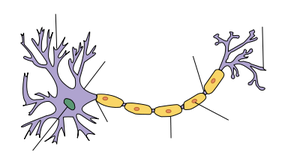 Multiple Sclerosis strikes each of its victims differently. Some patients suffer from cognitive difficulties, others from muscle weakness and spasticity, and yet others from severe fatigue. Most patients put up with their own peculiar blend of Multiple Sclerosis symptoms . One thing we all have in common, though, is that we are no longer "well". We have been set apart by disease, we are separated from the main, and instead have become members of an exclusive club that none of us wanted to join.
Multiple Sclerosis strikes each of its victims differently. Some patients suffer from cognitive difficulties, others from muscle weakness and spasticity, and yet others from severe fatigue. Most patients put up with their own peculiar blend of Multiple Sclerosis symptoms . One thing we all have in common, though, is that we are no longer "well". We have been set apart by disease, we are separated from the main, and instead have become members of an exclusive club that none of us wanted to join.
Most of us are diagnosed while our symptoms are still fairly mild, and for a while, we can pass as "well", our new club membership hidden from general view. But as the disease progresses it becomes unmistakably clear that something is wrong. We are no longer just like everybody else, dealing with the usual day-to-day crap that life hands out indiscriminately. Breakups, money troubles, deaths in the family; hell, we're all in that together. But when struck with illness, and particularly with an illness like MS that advertises its presence like a highway billboard, we become something different. We become the "other", and many people begin to treat us as such.
Like our symptoms, the change that we see in how others interact with us is subtle at first, almost imperceptible, but becomes more obvious as the illness continues to unmask itself. The disease not only wreaks havoc on us internally, physically and emotionally, but externally as well, as it changes our relationship with the world and the people who populate it.
As patients progress from invisibly ill to visibly disabled, many express dismay at how diminished they feel by the crass and thoughtless actions of others. There's one important thing to keep in mind when confronted with such situations, three little words that very succinctly sum up the whole of mankind: People are idiots. That goes for everybody, me included. I can easily look back over my life and recall countless instances of my own sheer idiocy.
I fully remember, back when I was well, becoming incensed at the wheelchair bound person who had the nerve to want to board the bus I was riding to work on. Their utter disregard for my schedule required the driver to get up out of his seat, walk to the back of the bus, operate the wheelchair lift, secure the disabled person in place, walk back to the front of the bus, and finally get us moving again. Dammit, that gimp made me late for work! I was fuming. Yes indeed, I was, am, and always will be an idiot. And so will everybody else in the world.
This is not to excuse people for their insensitivity, but rather is an attempt to understand them. Truly, most of them know not what they do. Generally, people are so wrapped up in their own lives that they give very little thought to those around them, disabled or not. If they do take a moment to ponder us, we serve primarily as a frightening reminder of their own frailty. When they treat us like we are somehow made less by our disabilities, or as if being in a wheelchair somehow implies that we are mentally feeble, or if they simply act with utter indifference to our difficulties, most often their attitudes and actions have no real malice behind them. They are just doing what human beings do, each of them experiencing their own version of reality, featuring themselves as the center of the universe.
I find the best defense against this plague of solipsism is a good offense. Speak up, develop a style, let your humanity shout from the rooftops. When out and about doing the Wheelchair Kamikaze thing, I'm usually wearing a fedora, and have my cobra head cane attached quite visibly to my chair. I drive the thing with a boyish abandon, refusing to allow the wheelchair to turn me into a shrinking violet. Quite the opposite, actually, I'm much more rambunctious now than when I got around on two feet. Very often, I also have a big honking camera rigged to the chair, which usually grabs people's attention. Flourishes like this seem to remind people that there is a human being in that mechanical contraption, and one that might even be interesting to talk to, if you can catch up to him.
Dealing with friends and family can be a much more complicated matter. Those with whom we share affection can be almost as traumatized by our illnesses as we are. This trauma can show itself in many different ways, most of them unpleasant, and some quite troubling. They run the gamut from doting and over attentiveness to the severing of ties and the ending of long-standing relationships.
I've seen several of those closest to me show themselves to be almost entirely unable to deal with my encroaching disability. One of my oldest and dearest friends, with whom I've shared some of my most guarded thoughts and feelings, as well as an almost comical mutual hypochondria, and who helped me through years of emotional ups and downs, was simply incapable of maintaining our relationship once I got sick. My illness simply scared the living crap out of her. If it could happen to me, it could happen to her, too, and I think that this reality was just too much to handle. It's now been several years since we last spoke, and honestly, I don't hold it against her. I know this person well enough to understand that this seeming disregard actually speaks to just how deeply she cared about me. She simply couldn't bear to watch me wither. Although, if she reads this, as I suspect she might, I'll say this: pick up the damn phone the next time I call, or I just might get angry. Stop being silly. I'm the same me that I always was, and I promise, over the phone you won't be able to see my MS...
I've seen similar responses in several very close family members, as well. On the phone, things are great, the same as they ever were, but in person there is a visible unease, an awkwardness over compensated for by false joviality and babbling happy talk. Again, I try my best to understand that this is an expression of the heartbreak they feel over my getting sick.
When I first started experiencing real difficulty walking, and was unsteady even with a cane, I watched one family member’s blood drain from his face as he watched me struggle, and I thought for a moment that he actually might pass out. Now, it's high time he get over it, and learn to deal with the new, unimproved me, but folks in general don't deal well with change. When that change involves somebody they love very deeply suffering from a horrendous and progressively crippling illness, their brains kick into denial mode, and some are simply not strong enough to force acceptance.
I am blessed to have several folks in my life who treat me just like the same old jackass I ever was. When I'm with them in the wheelchair, the only difference between then and now is that I suddenly seem to have gotten a few feet shorter. I'm still the target of their barbs and wisecracks, and they're still the target of mine. Once they understood it was okay, they've joined me in joking about my predicament. After all, the whole thing is simply too absurd to not joke about. Me, in a wheelchair? Zooming around like a crazy person, wearing a vintage fedora, accompanied by a wooden snake complete with fangs and forked tongue? Rolling around, taking pictures from my new and somewhat unique vantage point, and videotaping my near collisions with objects both animate and inanimate, great and small? You've got to admit, it's kind of funny. It gets less funny the more disabled I become, but still, when I stop being able to laugh at myself, that's when it's time to check out...
I've found that the people I have the most trouble coming to terms with are old friends that know nothing of my illness, who have tried to reconnect. In this age of Google and Facebook it's very easy for people who long ago drifted out of your life to find you and try to reestablish connections. For some reason, I find that I have some sort of an aversion to this kind of thing. Although many who have tried to reconnect are people that I've thought of often and who I'd really like to know again, I find myself unable to breach the MS hurdle.
I know this is strange, since I certainly make no secret of my MS (as is evidenced by this blog), but I've yet to respond to anyone from my past who isn't aware of my illness when they've tried to "friend" me on Facebook. It's gotten to the point where I'm practically Facebook phobic, and usually avoid the site.
Many of these folks are people who knew me in my 20s and early 30s, when I was young, reckless, and living a very bohemian lifestyle. In some ways, I think I'd rather them just remember me as I was, forever young. Thing is, now that I'm older and wiser, and having dealt with this freaking illness, I might actually be able to be of some benefit to them, if only to serve as an example of why they should live their life to the fullest each and every day. Still, I can't quite get myself to respond. Even as I write this, it sounds foolish, because I actually miss many of these people, and would likely very much enjoy having them back in my life.
As I said before, I have only one explanation. Just like everybody else, I am unquestionably an idiot. A complicated, disabled idiot, but an idiot nonetheless...
![Reblog this post [with Zemanta]](http://img.zemanta.com/reblog_e.png?x-id=45c1e26d-b26b-44ac-89f5-b31627954fc8)

![Reblog this post [with Zemanta]](http://img.zemanta.com/reblog_e.png?x-id=331e8347-f5ed-4013-9c68-4e7eff93860e)

![Reblog this post [with Zemanta]](http://img.zemanta.com/reblog_e.png?x-id=eb3d9e87-6f50-422a-ab2f-16e99186e69f)


![Reblog this post [with Zemanta]](http://img.zemanta.com/reblog_e.png?x-id=8ee17dd5-0413-4e2e-8165-35521c4430cf)

![Reblog this post [with Zemanta]](http://img.zemanta.com/reblog_e.png?x-id=e73e0a72-9f0c-4882-b9e8-de9aedce5cd8)

![Reblog this post [with Zemanta]](http://img.zemanta.com/reblog_e.png?x-id=8e7c54a4-5f0e-4898-a62c-ba0dfdf0543f)

![Reblog this post [with Zemanta]](http://img.zemanta.com/reblog_e.png?x-id=fe0b7d4b-c540-41f7-9dad-62c743e279e4)